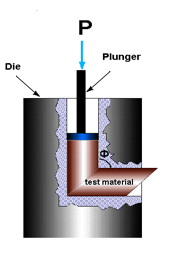
Photo from wikipedia
Abstract Equal Channel Angular Pressing (ECAP) is a metal forming process which is commonly used to refine grain structure in metals. The process involves pushing a billet, under high pressures,… Click to show full abstract
Abstract Equal Channel Angular Pressing (ECAP) is a metal forming process which is commonly used to refine grain structure in metals. The process involves pushing a billet, under high pressures, through a curved channel. Metal forming of molybdenum necessitates high forming temperatures so as to sufficiently lower the flow stress and increase ductility. These high temperatures are greater than the maximal temperature of the steel tools which are heated to a lower temperature then the billet. As a result great thermal gradients may develop during the forming process. In this study, the thermo-mechanical coupling between the temperature and deformation fields in ECAP of molybdenum was investigated using a computational/experimental methodology. First, the flow stress of molybdenum and copper (used as a dummy-block in the ECAP process) and the friction conditions with the steel tools at different temperatures were determined using cylindrical and ring compression tests in conjunction with an iterative coupled finite element analysis. Finally, a multi-stage finite element model of molybdenum ECAP was developed and validated by comparison to experiments. The computational results show that, in each pass, large temperature gradients develop across the specimen. While material points at the front and back of the billet may undergo similar equivalent plastic strains they deform at very different temperatures of T = 600 °C and T = 480 °C respectively. As a result, even after a single pass, each material point may have undergone a very different thermo-mechanical process. These differences in thermo-mechanical histories may lead to different microstructural changes along the specimen.
Journal Title: Journal of Materials Processing Technology
Year Published: 2019
Link to full text (if available)
Share on Social Media: Sign Up to like & get
recommendations!